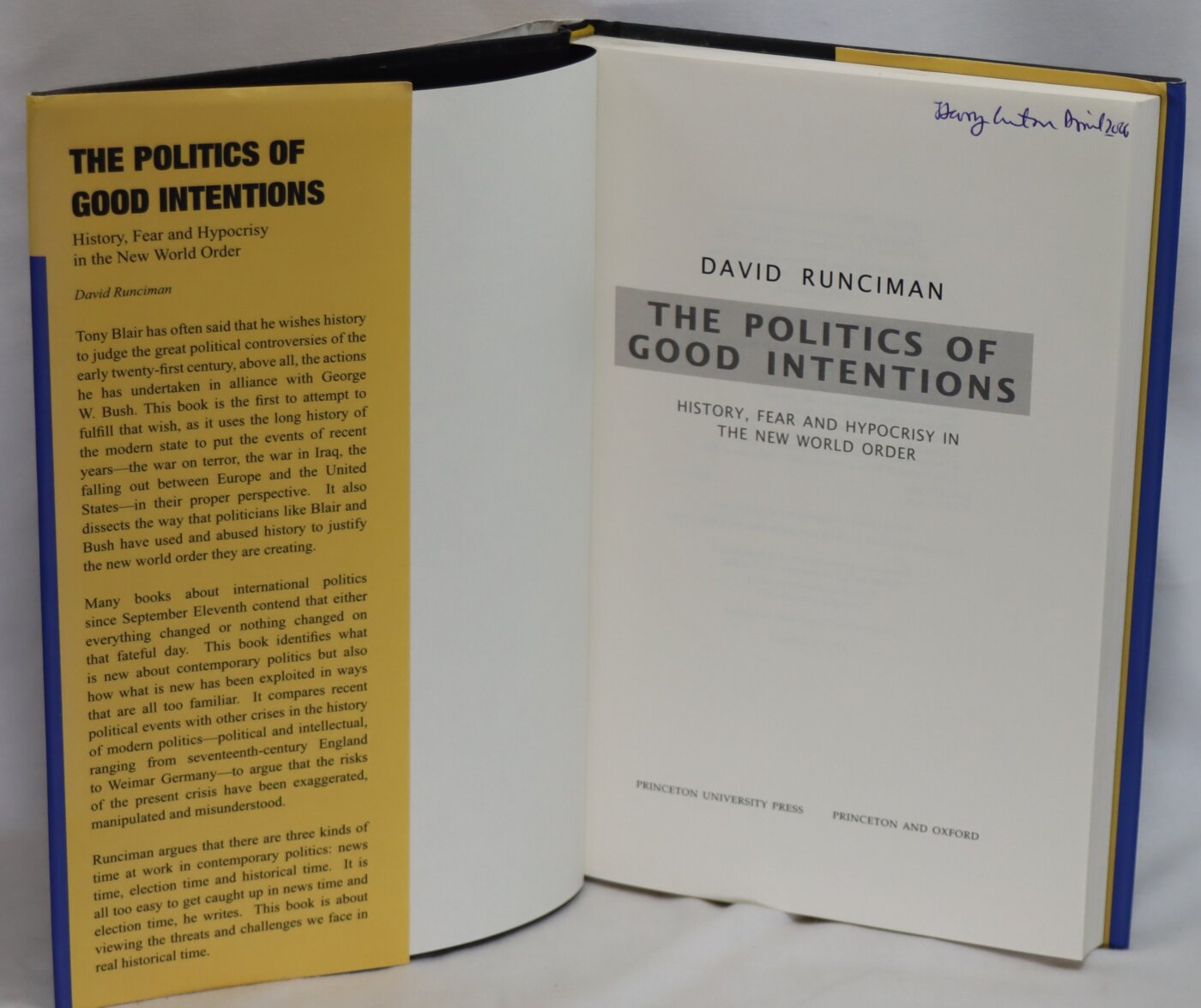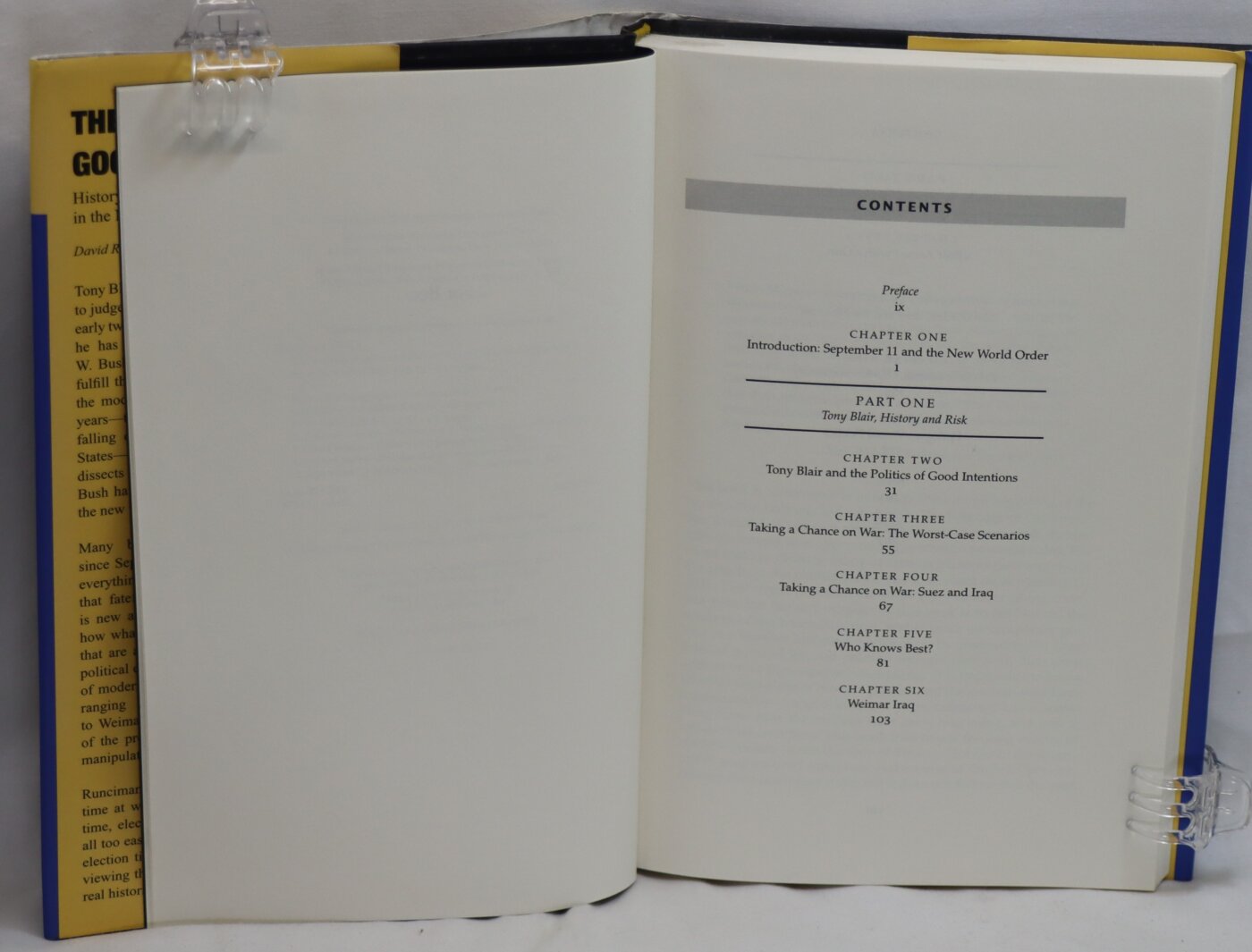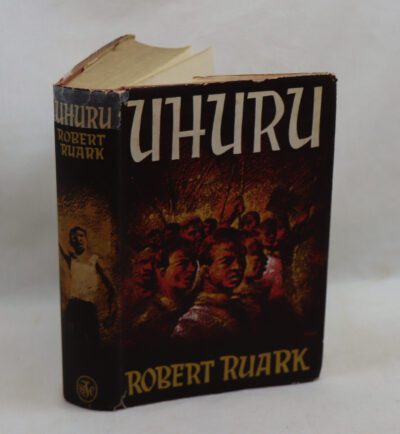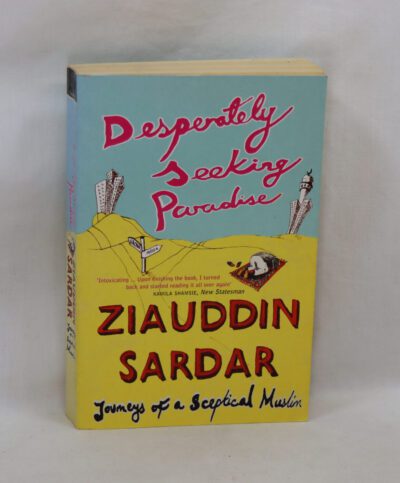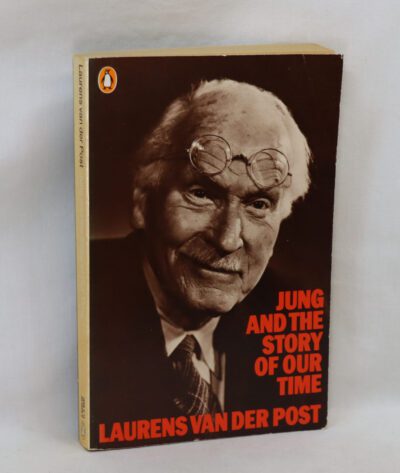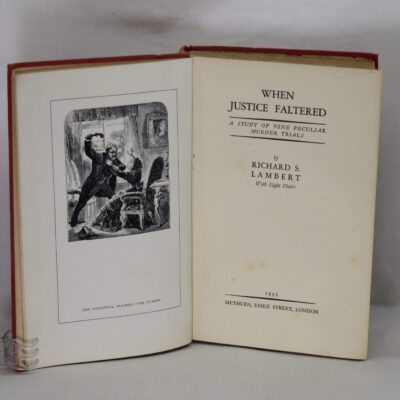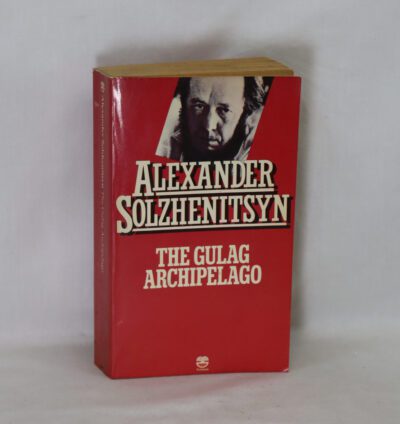The Politics of Good Intentions.
By David Runciman
ISBN: 9781400827121
Printed: 2006
Publisher: Princerton University Press. New Jersey
| Dimensions | 16 × 24 × 2 cm |
|---|---|
| Language |
Language: English
Size (cminches): 16 x 24 x 2
Condition: Fine (See explanation of ratings)
Your items
Item information
Description
In the original dust jacket. Black cloth binding with yellow title on the spine.
- We provide an in-depth photographic presentation of this item to stimulate your feeling and touch. More traditional book descriptions are immediately available
- Note: This book carries a £5.00 discount to those that subscribe to the F.B.A. mailing list.
Tony Blair has often said that he wishes history to judge the great political controversies of the early twenty-first century–above all, the actions he has undertaken in alliance with George W. Bush. This book is the first attempt to fulfill that wish, using the long history of the modern state to put the events of recent years–the war on terror, the war in Iraq, the falling out between Europe and the United States–in their proper perspective. It also dissects the way that politicians like Blair and Bush have used and abused history to justify the new world order they are creating. Many books about international politics since 9/11 contend that either everything changed or nothing changed on that fateful day. This book identifies what is new about contemporary politics but also how what is new has been exploited in ways that are all too familiar. It compares recent political events with other crises in the history of modern politics–political and intellectual, ranging from seventeenth-century England to Weimar Germany–to argue that the risks of the present crisis have been exaggerated, manipulated, and misunderstood.
David Runciman argues that there are three kinds of time at work in contemporary politics: news time, election time, and historical time. It is all too easy to get caught up in news time and election time, he writes. This book is about viewing the threats and challenges we face in real historical time.
Reviews:
-
- “The Politics of Good Intentions . . . signals a welcome re-engagement of contemporary political thinkers with politicians’ thought. We can but hope that Runciman’s efforts will be reciprocated.”– “Political Studies Review”
- “David Runciman combines the expositional clarity of a talented political journalist and commentator with the conceptual concerns, historical depth, erudition, and theoretical sophistication of a gifted scholar. The result is a lucidly and gracefully written book that usefully probes fundamental issues raised by both the terrorist attacks of 11 September 2001 and the highly dubious patterns of response associated with the political leadership of George W. Bush in the United States and Tony Blair in the United Kingdom.”—Richard Falk, International History Review
- “David Runciman provides a brilliant analysis of the contemporary politics of fear by situating the post-9/11 world within a layering of temporal periods and using the broad historical time in juxtaposition with ‘election time’ and ‘news time’. Through such a prism the fear generated and hypocrisy of much current political discourse and justification for the pursuit of war in Iraq is dissected.”—David Ryan, International, Affairs
- “Mr. Runciman is a keen observer of contemporary political life whose sophisticated sense of history both tempers and enlivens his often thrilling polemics. Over the course of the collection, Mr. Runciman compares the political fallout from Iraq to the Suez crisis, uses the model of Weimar Germany to explore the possibilities of Iraqi reconstruction and democracy, and borrows from thinkers like Max Weber to shed light on contemporary politics. The results are never pedantic and almost always deeply revealing.”—Jason Moring, New York Observer
- “Runciman concludes, there is little new about the new world order. Whatever difficulties it throws up are best dealt with by going back to political basics–having strong parties, muscular parliaments, balanced constitutions, an alert judiciary and a watchful public. It is a measure of how far we have traveled from the liberal democratic norm that this comes across as a radical cry.”—Alison Rowat, The Herald
- “The proximate cause of Tony Blair’s decline is self-evident: the Iraq war and its sequel. However, as David Runciman shows in this mordant study of political hypocrisy and the misuse of history in our time, the inability to distinguish make-believe from facts, the contempt for due process and the almost willful ignorance of history that were the hallmarks of Blai”s Iraq adventure could, and should, have been detected well before it.”—David Marquand, New Statesman
- “This is a powerful piece, a short critique of the types of rhetorical arguments used by the creator of New Labor in his notorious ‘preacher on a tank’ mode. Runciman assails the use of ‘new dangers’ as a justification for ‘new obediences, ‘ the way that if a ‘risk’ is ‘new, ‘ a democratic leader need not make the normal informed balance of known risk and known freedoms, and thus the way that not taking the country to war becomes a ‘risk no responsible government could afford to take.’ . . . Essential for understanding how he is likely to be judged when he leaves office? Sadly, absolutely.”—Peter Stothard, Globe and Mail
- “Wonderfully written, lively, and energetic, The Politics of Good Intentions provides an illuminating guide to a host of contemporary issues, both practical and theoretical. Runciman marches to the beat of no drummer; his analysis is invariably fresh and often remarkably creative.”–Cass Sunstein, Karl N. Llewellyn Distinguished Service Professor, Law School and Department of Political Science, University of Chicago
- “Whenever I read David Runciman, I’m reminded of what I’m always missing in contemporary political writing: perspective. Theoretically sophisticated and empirically concrete, witty and serious, historical and contemporary, Runciman is the E. H. Carr or A. J. P. Taylor of our times–always engaged, always pushing, always a surprise. His is a genuinely transatlantic voice of sanity and hope, which should be heard on both sides of our shared pond.”–Corey Robin, City University of New York, author ofFear: The History of a Political Idea
- “We have been waiting for a book on the world after 9/11 and the decision to go to war in Iraq, and this is it. David Runciman’s The Politics of Good Intentions is a masterly analysis of the mix of moralizing illusion and economy with the truth that has infected politics since the terrorist attacks, and which took the U.S. and Britain into an unending war in Iraq. Rigorously reasoned and written with a spare elegance and grace, this will be the canonical book on Blair, Bush, and Iraq for some time to come.”–John Gray, London School of Economics, author of Al Qaeda and What It Means to Be Modern andStraw Dogs: Thoughts on Humans and Other Animals
- “Wonderfully written, lively, and energetic, The Politics of Good Intentions provides an illuminating guide to a host of contemporary issues, both practical and theoretical. Runciman marches to the beat of no drummer; his analysis is invariably fresh and often remarkably creative.”–Cass Sunstein, Karl N. Llewellyn Distinguished Service Professor, Law School and Department of Political Science, University of Chicago
- “Whenever I read David Runciman, I’m reminded of what I’m always missing in contemporary political writing: perspective. Theoretically sophisticated and empirically concrete, witty and serious, historical and contemporary, Runciman is the E. H. Carr or A. J. P. Taylor of our times–always engaged, always pushing, always a surprise. His is a genuinely transatlantic voice of sanity and hope, which should be heard on both sides of our shared pond.”–Corey Robin, City University of New York, author of Fear: The History of a Political Idea
- “We have been waiting for a book on the world after 9/11 and the decision to go to war in Iraq, and this is it. David Runciman’s The Politics of Good Intentions is a masterly analysis of the mix of moralizing illusion and economy with the truth that has infected politics since the terrorist attacks, and which took the U.S. and Britain into an unending war in Iraq. Rigorously reasoned and written with a spare elegance and grace, this will be the canonical book on Blair, Bush, and Iraq for some time to come.”–John Gray, London School of Economics, author of Al Qaeda and What It Means to Be Modern and Straw Dogs: Thoughts on Humans and Other Animals
David Walter Runciman, 4th Viscount Runciman of Doxford, FRSL (born 1 March 1967), is an English academic and podcaster who until 2024 taught politics and history at the University of Cambridge, where he was Professor of Politics. From October 2014 to October 2018 he was also head of the Department of Politics and International Studies. In April 2024 he decided to resign his position at the university to focus on his podcast full-time. He was subsequently made Honorary Professor of Politics.
Runciman was born in St John’s Wood, North London, England, and grew up there. His father, Garry Runciman, Viscount Runciman, was a political sociologist and academic and his mother, Ruth Runciman, is former chair of the UK Mental Health Commission, a founder of the Prison Reform Trust and former chair of the National Aids Trust. He was educated at Eton College, an all-boys public school in Berkshire, where he won the Newcastle Scholarship. He went on to study at Trinity College, Cambridge.
Want to know more about this item?
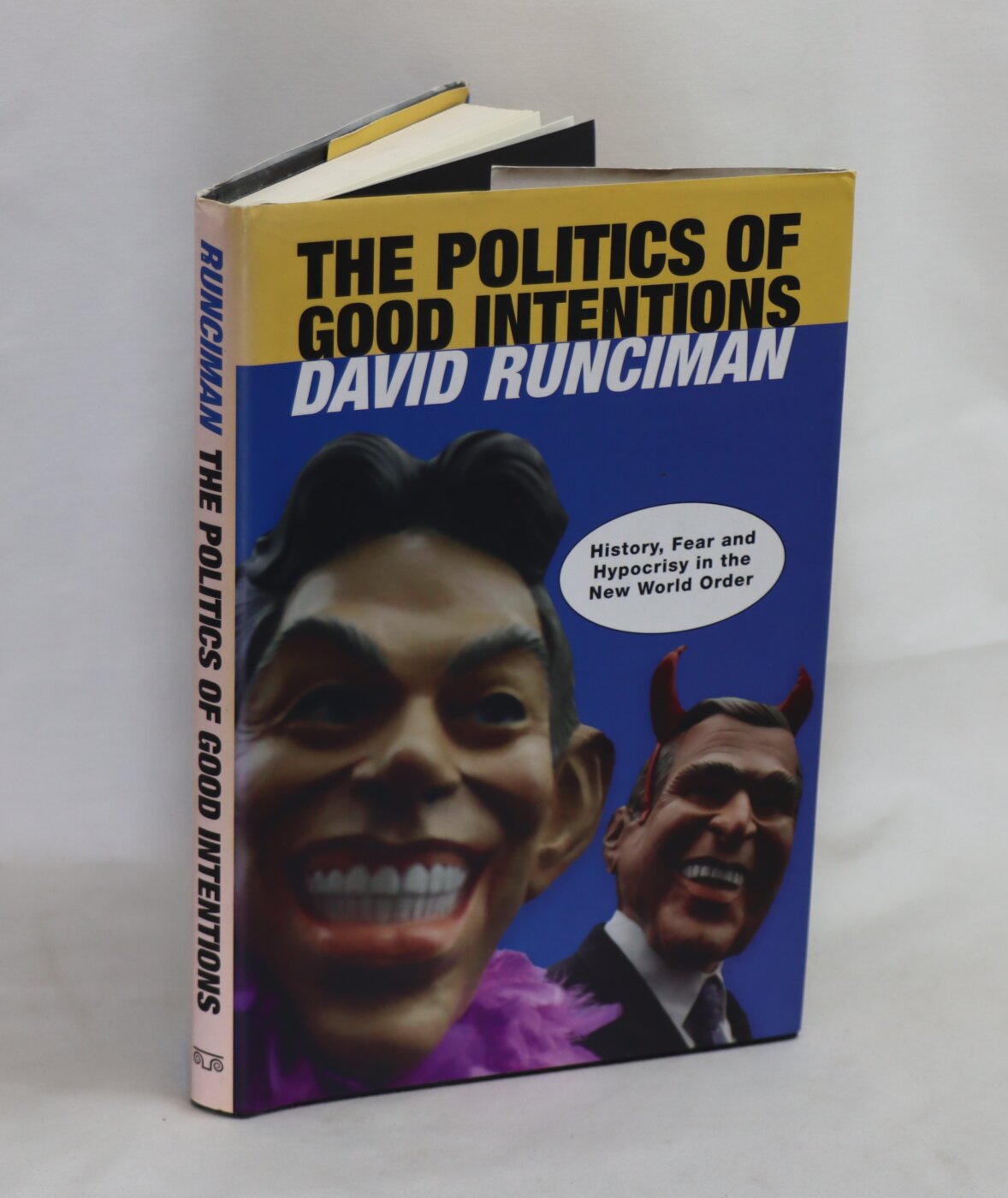
Related products
Share this Page with a friend

